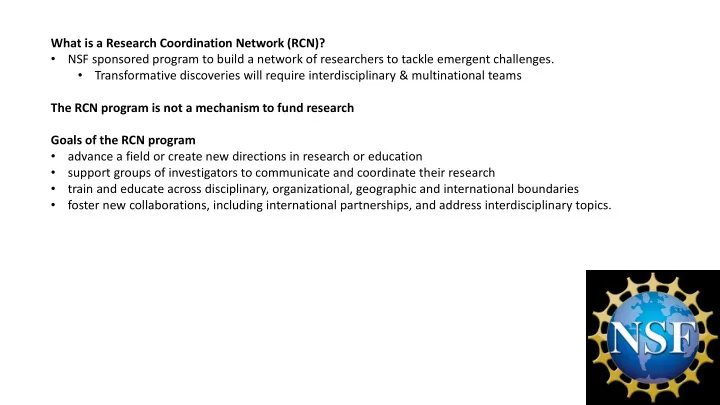

What is a Research Coordination Network (RCN)? NSF sponsored program to build a network of researchers to tackle emergent challenges. • Transformative discoveries will require interdisciplinary & multinational teams • The RCN program is not a mechanism to fund research Goals of the RCN program advance a field or create new directions in research or education • support groups of investigators to communicate and coordinate their research • train and educate across disciplinary, organizational, geographic and international boundaries • foster new collaborations, including international partnerships, and address interdisciplinary topics. •
Predicting vertebrate responses to a changing climate: modeling genomes to phenomes to populations Goal: establish a collaborative network spanning from genomes to populations to facilitate development of novel quantitative approaches to address the urgent challenge of predicting how species and populations will respond to a changing climate. Primary activities: Host annual workshops to foster education and formation of new • interdisciplinary collaborations Train through exchanges between laboratories • Develop and disseminate webinars derived from the workshops • Develop and distribute educational modules to incorporate into K-12 • curricula Principle Investigators: C. Loren Buck, Allyson Hindle, Nika Galic Steering committee: Frank van Breukelen, Jenifer Utz, Marty Martin, Michael Romero, Kenia Bicego, Elinor Karlsson, John Delong Student Representative and Outreach Coordinator: Haley Hansen Support staff: Megan Coe, Gabrielle Chambers
Goal: 1) establish a collaborative network : 114+ members from >40 universities/agencies & >12 countries. Primary activities : 2) Host annual workshops to foster education and formation of new interdisciplinary collaborations “Navigating Climate Change,” September 19-21, 2018, Flagstaff, AZ • 38 participants, international and national • “Modeling from Genomes to Phenomes to Populations,” summer 2019, Minneapolis, MN • “Assessing High-Throughput Genomic Approaches,” summer 2020, Boston/Cambridge, MA • “Modeling Mechanisms of Phenotypic Plasticity and Epigenetics”, summer 2021, Las Vegas, NV • “Synthesizing g2p2pop,” summer 2022, Paraty, Brazil • Final report to NSF • NSF STC • 3) Train through exchanges between laboratories Lots of opportunities here (15+ per annum). • 4 funded, 2 International, 2 national • 4) Develop and disseminate webinars derived from the workshops All in the works; talks from this and future workshops will be recorded and made available on our • website. https://nau.edu/cbi-rcn-g2p2pop/ Other materials are broadly dissemination on web and social media outlets • 5) Develop and distribute educational modules for incorporation into K-12 curricula Recruited teachers & staff from Clark County School District; curricular development in • collaboration with Dr. J. Utz
“Navigating Climate Change” 9.30-10.30am: Dr. Scott Goetz : Professor, NAU, Flagstaff. Satellite remote sensing research for environmental science applications • 10.45-11.45am: Dr. Andrew Richardson : Professor, NAU, Flagstaff impacts of global change on terrestrial ecosystems, and the feedbacks between • terrestrial ecosystems and the atmosphere 1.15-2.15pm: Dr. Thomas Whitham : Regents Professor, NAU, Flagstaff plant-herbivore interactions and a community-level understanding of the • consequences of plant genetics and environmental stress on keystone species 2.30-3.30pm: Dr. Stephen Jackson : Director, USGS, Southwest Climate Adaptation Science Center, Tucson Vegetation and climate history of North America since the last glacial maximum & • adaptation to climate change
Recommend
More recommend